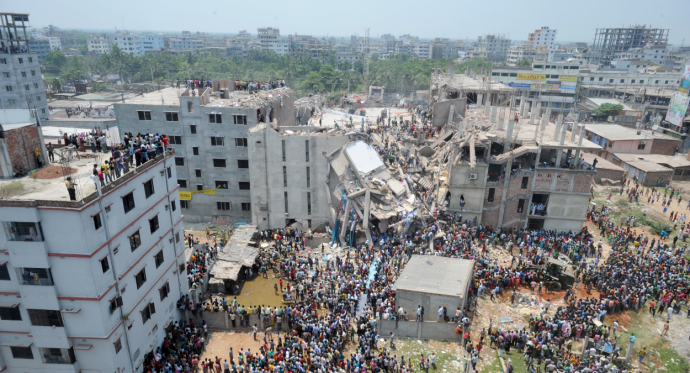Pamina Koenig* and Sandra Poncet*
This article was originally published in the January 2021 edition of the 5 papers…in 5 minutes.

The globalisation of production processes has made the task of identifying social and environmental responsibilities in production operations more difficult because such operations are subject to the sometimes less stringent regulations in supply countries. NGOs, in particular, have developed strategies to counter the lack of transparency in global value chains and denounce publicly those companies whose production conditions they judge unethical. The goal is to make such companies change their sourcing decisions when they see that their reputations are threatened. The efficacy of such campaigns remains unknown in the academic literature because of the difficulty of measuring the changes demanded by the NGOs and any adjustments made by the firms.
In this article, Pamina Koenig and Sandra Poncet use a dramatic and exceptional event – the collapse of the Dhaka garment factory in Rana Plaza in Bangladesh, 24 April 2013 – to quantify the supply adjustments made by the brands implicated in the disaster. The empirical task is to estimate the extent to which this great industrial scandal, which exposed a disregard for the safety of the workers making clothes for some of the big fashion names, has affected retailers’ imports. The analysis combines company-level textile and clothing import data from French customs with the list of the 29 international retailers (Zara, Mango, Camaieu etc.) identified as sourcing garments manufactured at Rana Plaza at the time of its collapse. The aim is to see how clothing import flows into France have changed since then, according to whether the name of the ordering company is associated with responsibility for the collapse. Three scenarios are presented, each reflecting a different way of reacting to the disaster through either demand or supply.
The first hypothesis is the “Bangladesh effect”, in which all imports into France from Bangladesh are affected negatively, regardless of the brand in question, because of either a selective consumer boycott of imports from Bangladesh, or a change to local supply conditions. The second hypothesis is the “Rana Plaza companies effect”, in which all imports by businesses that sourced their supplies from Rana Plaza decrease, regardless of their origin (Bangladesh or elsewhere). This could be explained by the fact that consumers wanted to punish the firms associated with the catastrophe. The third effect, “Rana Plaza companies limited to Bangladesh”, implies that only the flow of imports from Bangladesh by companies known for their relationship with the Rana Plaza is reduced following the disaster. Only the latter scenario is validated by the estimations: there has been a relative decrease in imports from Bangladesh by the firms whose name is directly associated with the collapse, without any change in the overall volume of their global imports. This reduction is significant: compared to other importers from Bangladesh, on average the imports from Bangladesh by a company linked to Rana Plaza dropped by 37% after the collapse. To explain this result, the scenario of a selective boycott (of Bangladesh and of products of incriminated brands) seems unlikely; the findings tend to support a relocation by the cited brands of some of their imports to supply countries outside Bangladesh. Indeed, parallel to the relative decrease in supply from Bangladesh to these firms, the authors estimate that there has been a relative increase in their imports from three other countries, all closer to France geographically and in norms (Portugal, Morocco and Turkey). These findings suggest that the brands have sought to limit the damage to their reputation caused by the Rana Plaza tragedy.
………………..
References
Original title of the article: Effects of the Rana Plaza collapse on sourcing choices of French Importers
Previously published under the title: Reputation and (un)fair trade: Effects on French importers from the Rana Plaza collapse, as a PSE Working Paper n° 2019–71
Available at: https://halshs.archives-ouvertes.fr/halshs-02418274/
* PSE Members
Credits: Shutterstock – Sk Hasan Ali
